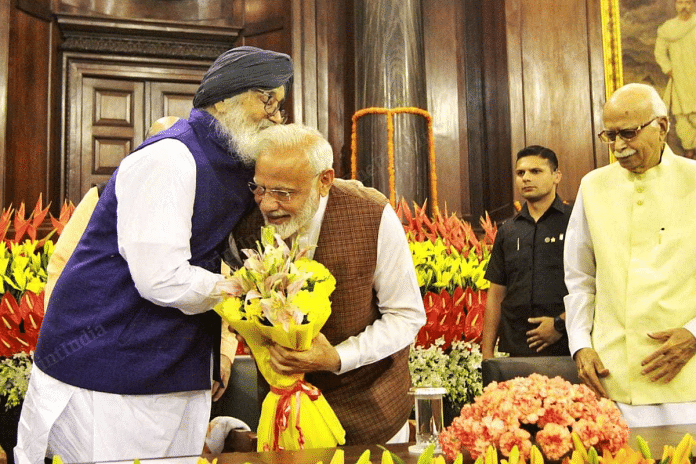A leader is one who knows the way, goes the way, and shows the way: John Maxwell. This quote aptly describes the journey of Parkash Singh Badal ji, or “Badal saab”, who redefined politics as an instrument of public service, particularly for the people of Punjab. As a young boy growing up in the state, I witnessed how Badal saab was synonymous with Punjab’s politics. He had earned this aura through his hard work, charisma, dedication, and service to the people in a career that spanned over seven decades.
Since becoming India’s youngest Sarpanch at the age of 20 till his last breath, Badal saab lived a life of struggle, service, and sacrifice. Jailed for the civil liberties movement and during the 1975 Emergency, Badal saab claimed to be the longest political prisoner in the world after Nelson Mandela. But each time he was pushed back, he resurrected with greater force. He had the distinction of being the youngest legislator in the Punjab Assembly and the state’s youngest and oldest chief minister. After all, not many politicians win 10 back-to-back elections like he did.
A true people’s politician
The veteran politician is an inspiration for all, particularly for the younger generations in public life. If politics is about chemistry between politicians and people, Badal saab’s life was perhaps its greatest epitome. His biggest strength was his affability, accessibility, and mass connect, which is why, as his greatest critics would admit, he was called a true people’s politician.
Even when he was chief minister of Punjab, anybody, from a Sarpanch to an MLA, could reach out to him by making an appointment just two hours prior. He patiently listened to everyone and personally ensured their grievances were addressed. If a young leader has to learn the art of doing politics without demons of ego and arrogance, they must learn from Badal saab’s life, who would even spend a night at a disgruntled party worker’s home to placate them. His sangat darshan initiative, which brought the government closer to the people, is still considered an ideal path for engaging with the public. He loved to be among the people, and nobody ever returned from his home without meeting or breaking bread with him at his village Lambi. Besides, he was an excellent conciliator who played a critical role in weaving several coalition governments.
Also read:
A witty, non-confrontational leader
Badal saab was the bridge that connected parties and leaders. His commitment to the development of Punjab and concern for India’s peace and sovereignty led him to the Jan Sangh and, later, the Bharatiya Janata Party (BJP). In fact, Akali Dal was the first to offer support to the Atal Bihari Vajpayee government in 1996.
Badal saab never believed in the politics of confrontation and always reached out to leaders in case of differences in opinion. Behind his white beard, he was a witty politician who could floor any audience with his instant humour. This side of his personality cemented his relationship with leaders like Vajpayee. To end militancy in Punjab, he initiated dialogue with militants and worked toward finding a peaceful solution to the problem. The return of peace to Punjab in the late 1990s could not have been possible without the Akali Dal and BJP’s combined efforts and the genuine bonhomie among their leaders. The alliance successfully tackled the challenges of building a post–militant, modern Punjab, ensuring communal peace and winning people’s trust.
Badal saab, who anchored Punjab during critical times, worked for the state’s development with a detailed roadmap – from agriculture to infrastructure and from education to employment. Ranjit Sagar Dam, which is not only the powerhouse of Punjab but also a major irrigation channel for farmers, was built by him, speaking volumes about his vision for the state. His leadership during the Green Revolution, his successful bid to persuade farmers to opt for modern technology, and his push for agri-infrastructure helped Punjab become a food grain surplus state. He also strengthened modern education and healthcare facilities in Punjab. His works made him a popular leader among the masses, particularly the rural peasantry.
However, despite being one of the tallest national leaders, he never forgot his roots. Since he began his political journey from his native village of Badal, that identity became an indelible mark of his persona and legacy. Throughout his life, he was committed to Panth, Punjab, and Punjabiyat. Protection and promotion of Punjabi culture, language, and heritage were always close to his heart. His demise is the end of an era, and his absence will always be felt, but his life and works will continue to inspire younger generations on the path of duty and devotion to the country.
Jaiveer Shergill is a Supreme Court Lawyer and National Spokesperson, Bharatiya Janata Party. Views are personal.
(Edited by Zoya Bhatti)



